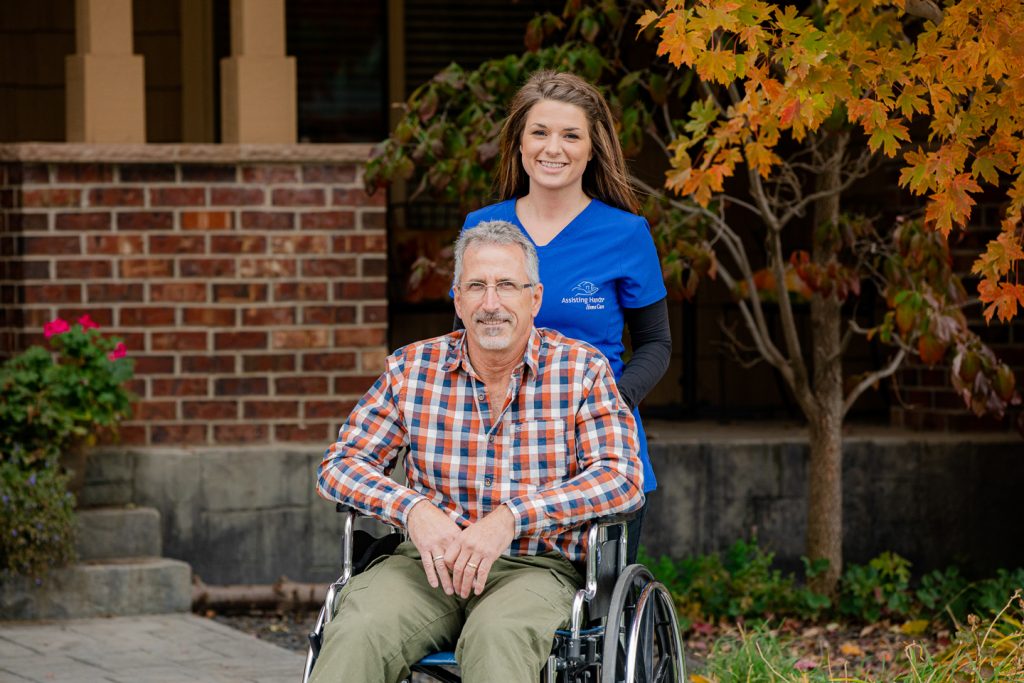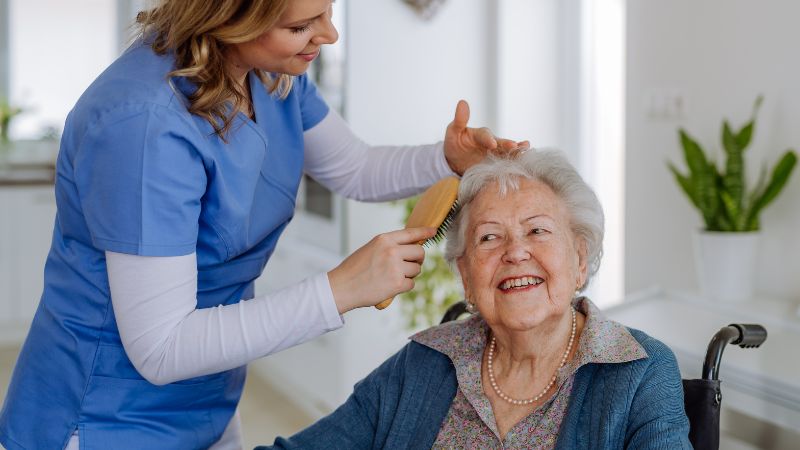
Seniors are at risk for developing disabilities due to the age-related decline of cognitive and physical functioning. Various disabilities can impact an elderly loved one’s life. Families and caregivers should take steps to improve the quality of life for the disabled senior.
Scientists at the Centers for Disease Control and Prevention (CDC) find that disabilities are most common in people who are aged 65 and over. Approximately two out of five individuals in this age group live with some type of disability.
Per the CDC, disabilities primarily fall into any of six categories: hearing, vision, cognition (which includes struggling to make decisions or remember), mobility (such as difficulty walking or climbing stairs), self-care activities (having trouble dressing or bathing), and independent living.
Seniors who have severe difficulty with hearing, seeing, mobility, or the ability to run a household will be significantly challenged to live independently in the community. For individuals living with a disability, however, extra support at home can result in an improved quality of life.
1. Modify the Home
Investing in accessible housing eases the daily life of seniors with physical activity limitations. Family members can make home modifications to improve the disabled loved one’s well-being. At home, for example, performing the ADLs may be partially achieved via accessible housing.
Accessible housing is designed to facilitate the senior’s ability to perform essential tasks in the home environment. The elderly who have difficulty bathing or toileting will find support with walk-in showers, grab bars on the bathroom walls, and raised toilet seats.
Additional home modifications include widening doorways and installing ramps for individuals using a wheelchair or walker. Indoor ramps provide a smooth transition from room to room. Ramps also increase the safety for wheelchair-bound seniors as they navigate throughout the home.
Accessing the kitchen counter and reaching into high cabinets are challenges for seniors in a wheelchair. A professional contractor will lower the height of the counter and sink, thereby allowing seniors to access them from a seated position. Out-of-reach items are accessible via tools, like reachers.
2. Hire Dependable Transportation
Seniors living with a disability still have the need to conduct errands. Although public transportation is becoming increasingly available to the disabled, families should consider a handicap transportation service or a professional caregiver who will provide safe and reliable transportation.
3. Be Fitted for a Hearing Aid
Hearing impaired seniors will experience improved hearing when fitted with a hearing aid. An audiologist or hearing healthcare professional is qualified to perform a diagnostic hearing test to determine the degree of hearing loss, dispense a hearing aid, or suggest medical treatment.
Find out The Difference Between A Hearing Aid and Sound Amplifier
4. Install a Home Alert System
A home alert system is vital to the senior’s safety and well-being. If the elderly individual falls when alone, an alarm will notify the emergency contact or caregiver. Alarms built with two-way speakers allow direct communication between the senior and emergency contact.
Here are some Apps You Can Use to Check on Your Elderly Parents
5. Introduce a Pet or Plant
Elderly individuals living with a disability benefit from the loyal companionship of a pet. Taking care of a furry friend elevates a senior’s mood. If being responsible for a pet is an unmanageable task, the senior will reap the emotional rewards of caring for a household plant.
6. Hire Memory Care
Dementia can cause seniors to experience self-care limitations. These seniors benefit from compassionate memory care. Dementia care is provided by professional caregivers who are trained to identify and address dementia symptoms and help the senior complete the activities of daily living.
7. Share Hobbies
Despite living with a disability, many seniors continue to enjoy a range of hobbies. Hobbies may include arts and crafts, sports or collecting figurines, for instance. Family and professional caregivers who are involved in the senior’s hobbies enhance the latter’s life.
Supporting the senior’s hobbies may be achieved by sharing opinions or offering constructive feedback about an artistic endeavor, attending the senior’s sports competitions, discussing the creative process of crafting, or simply providing transportation to craft fairs, athletic games, or art shows.
Check out our blog post about Fun Activities for Bedridden Seniors and Seniors with Limited Mobility
8. Spend Quality Time
Family members are encouraged to spend quality time with a loved one living with a disability. Social connections are invaluable to overall well-being. Sharing recreational activities, going to concerts together, or chatting about the day’s events enhance the senior’s quality of life.
When relatives live too far away to provide daily emotional support, companion caregivers are an excellent alternative. These professionals build meaningful bonds with care recipients and join them in recreational pursuits, thereby reducing the inherent dangers of social isolation and loneliness.

While the abovementioned recommendations will improve the daily life of a senior living with a disability, families are encouraged to seek the comprehensive support provided by a home care agency, like Assisting Hands Home Care. Extra support helps seniors flourish.
As a leader in senior care, Assisting Hands Home Care caregivers are experienced in helping seniors and disabled adults live safely and comfortably at home. Since the majority of elderly individuals prefer to age in place, home care is the ideal solution when in-home support becomes necessary.
Our professional caregivers provide discreet help with all the activities of daily living, such as getting dressed, toileting, bathing, and grooming. Core responsibilities also include shopping for groceries, preparing nutritious meals, and performing light housekeeping to ensure a hygienic environment.
Assisting Hands Home Care service providers serve as dependable companions to improve the lives of seniors with disabilities. The relationships we build with elderly care recipients are valued, especially when family members are unavailable to engage on a daily basis with senior loved ones.
Assisting Hands Home Care also provides quality dementia and Alzheimer’s care, after-surgery care, and hospice care. Services are flexible, ranging from short-term respite care to 24-hour care. Our professional caregivers can accommodate a range of schedules, from morning to night.
Families with seniors living in Lombard, Glendale Heights, Villa Park, Itasca, Medinah, Elmhurst, Bensenville, Addison, Illinois, and its surrounding communities, will find dependable home care from Assisting Hands Home Care. Set up an in-home consultation to start compassionate senior care and enhance your loved one’s overall quality of life.
















